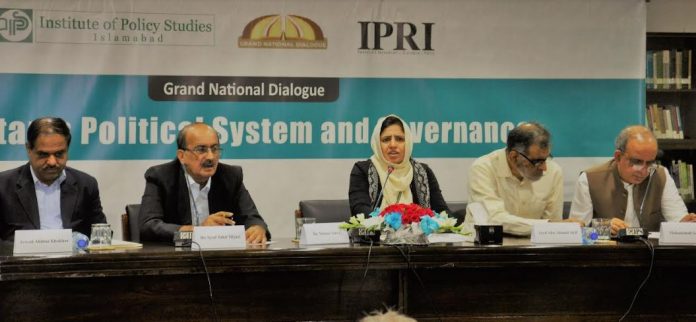DNA
Islamabad, NOV 4: Constitutional supremacy, electoral reforms to ensure inclusivity, rule of law, focus on public service delivery, leadership development, taking responsibility and ownership, citizenship awareness, participatory governance based on the realities of socio-political culture of Pakistan instead of adopting Western models, and optimum use of technology for creating efficient systems for governance at all levels of the state were the salient ideas put forward and extensively debated by eminent policy practitioners and academics in a seminar jointly organized by Institute of Policy Studies (IPS) and Islamabad Policy Research Institute (IPRI).
The session titled ‘Political System and Governance in Pakistan’ was part of the ‘Grand National Dialogue’ initiated by IPRI recently, aiming to take inputs and ideas from academics, intellectuals and practitioners over a host of national issues, in a bid to convert them into actionable recommendations for policy makers.
Chaired by Chairman IPS Khalid Rahman and co-hosted by Brig (r) Raashid Wali Janjua, director research at IPRI and Ambassador (r) Syed Abrar Hussain, vice chairman at IPS, the seminar was addressed by Syed Abu Ahmad Akif (SI), former federal secretary, Dr Syed Tahir Hijazi, former member governance, Planning Commission of Pakistan, Dr Noreen Saher, associate professor/chairperson, Department of Anthropology, International Islamic University, Islamabad (IIUI), Muhammad Arshad, CEO, Sehat Sahulat Program, Ministry of National Health Services, Regulations and Coordination, Government of Pakistan, and Jawad Akhtar Khokhar, advisor, maritime affairs, Planning Commission of Pakistan. Naufil Shahrukh, IPS’ GM Operation, moderated the session.
Initiating the discussion, Akif put up a series of questions highlighting several internal and external contributory factors leading to the governance deficit in Pakistan. He underscored economic mismanagement, political disorder, deteriorating civil services, civil-military relations, internal conflicts, lawlessness, extremism, militancy, intolerance, rising debts, external forces, and geo political circumstances as some of the reasons behind the sorry state of affairs in the country.
He urged on the need to change the mindset to a productive and constructive one, stressing that no problem can be solved by the same thinking that generated it in the first place.
Arshad backed Akif’s notions, maintaining that not everything was bad in the country and several success stories can be seen in its journey of seventy-five-years. The development of nuclear weapons and the success against the war on terror were a couple of highlighted examples, but the country has also witnessed commendable progress in some other areas as well and the national capacity to use ICT for governance and public service delivery is at par with the developed nations.
The speaker termed the successful planning and implementation of Sehat Sahulat program no less than an achievement itself, as it was delivering health services to 170 million people through 1036 hospitals across the country. A precedence of such a model with such magnitude and in the face of such insurance challenges, according to him, was not even seen in the G7 countries, and the fact that all this was done with any political conformity makes this achievement even sweeter.
The speaker maintained that this is just another success example that can be replicated in other sectors as well. The only requirement is to channelize the available resources and adopt the real model of inclusive governance where everyone has a specific role to play, for which he takes ownership and becomes responsible and accountable.
Khokhar spoke from the perspective of Gwadar, pointing out challenges in the areas of Gwadar port and city integration, travelling, connectivity and training. On the other hand, he also highlighted some achievements with the help of Chinese institutions in the area and participation of all stakeholders at the federal, provincial and local government levels. He claimed that the genuine, basic demands of the natives were being taken care of now and the past mistakes have been mostly rectified.
Dr Hijazi mentioned NADRA as one of the country’s biggest success stories as a facilitator and catalyst of good governance.
Dr Seher termed negativity and pessimism about our own culture as a disease. She quoted that nations face good and bad times, but ethnocentrism prevents them from going down. We, on the other hand, are facing Xenocentrism, which is the result as well as the target of the fifth-generation warfare.
She pointed out that there exists extensive natural and cultural diversity in Pakistan, but the real problem is the lack of ownership and twisted priorities. With 60 percent youth population, Pakistan is extremely rich in its contemporary resource and only need to bring competence into the mainstream. In the era where proxy war is being waged to divide the country, we need to capitalize on our strengths of collectivism and networking.
Khalid Rahman, concluded the session by advocating for electoral reforms for proportionate democracy, strengthening local body system and student unions as nurseries of healthy democracy, intra-party democracy, use of technology and digitization for governance, smaller administrative units and fiscal devolution.
He also highlighted the Principles of Policy of the Constitution of Pakistan that are a guiding light for the essential morality and value framework for the country’s governance at all levels.
He viewed that there were need for reforms in many areas, but the constitution should always be protected and the parliament should be strengthened. The hybrid model of governance should gradually be eliminated, though not by means of any conflict. Instead of being wasted on finger pointing, the energies should rather be utilized to come out of the problems collectively.
Rahman opined that we need to look through a bifocal lens, through which we could see both our weaknesses and strengths. On the other hand, we must not stay in the mode of denial, and start taking ownership of our own responsibilities while avoiding any blame game.
















